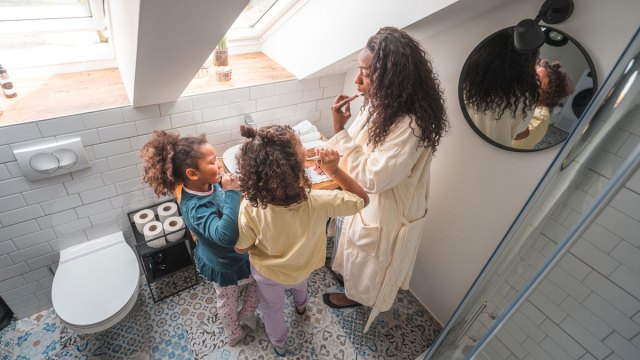We all love a pristine home, but let’s be real—sometimes, our cleaning efforts only scratch the surface. Homes can be a playground for germs, bacteria, and fungi if we aren’t meticulous enough about cleaning. That’s where experts like Ryen Toft, owner and founder of Simply Luxe Organizing, come in. Toft knows all the dirty secrets about the areas in our houses that often get overlooked; with her help, we can finally expose and sanitize those bacterial hotspots and enjoy a clean and healthy living space. Whether it’s a hard-to-clean material like jute or off-the-radar spots like fan blades, here’s a list of the germiest places in your home that you probably aren’t cleaning often enough (plus how to go about doing so).
Germiest Places in Your Home: The Bathroom
Bathroom Mats
Looks can be deceiving, and we often think bath mats are clean since we’re stepping out of the shower or bath with freshly washed feet. In reality, fabric bath mats collect a lot of moisture, dirt, debris, and other microscopic bacteria.
Cleaning Tip: Wash mats at least once a week and try to decrease humidity in your bathroom with open windows and fans.
Toothbrush Holder
It’s easy to forget about something as simple as a toothbrush holder, but studies consistently show that it is one of the top five breeding spaces for germs.
Cleaning Tip: Make sure to rinse toothbrushes thoroughly after use, allow them to dry completely, and replace them every 3 to 4 months. Clean the holder by soaking it in warm water mixed with a little bleach for 30 minutes. Rinse and soak it in clean water for another 30 minutes to remove the bleach residue. Better yet, use a cup you can toss in the dishwasher.
Area Around the Toilet
Toilet bowls top just about everyone’s must-clean list, but the area around the toilet is less obvious and just as filthy.
Cleaning Tip: Combine one cup of table salt, one cup of baking soda, and one cup of oxygen bleach—these will help disinfect and loosen up the build-up. Allow the solution to rest for an hour and wipe with a damp cloth. Equal parts baking soda and vinegar can also do the job.
Related: TikTok Cleaning Hacks That Actually Work
Germiest Places in Your Home: The Kitchen
Sponges / Dishtowels
Sponges and dishtowels are great for cleaning up messes and absorbing liquid quickly, but they pick up plenty of foodborne pathogens along the way, which can lead to food contamination and cause illness. Don’t wait until your sponge starts smelling—an obvious sign it’s harboring bacteria. It’s recommended to clean your sponge frequently or replace it once a month to ensure proper hygiene.
Cleaning tip: There are several ways to clean a sponge to kill bacteria. Choose to microwave the damp sponge for a minute, put it in the dishwasher—set it on the hottest cycle, or soak it in a solution of one-quarter teaspoon of concentrated bleach per quarter of warm water.
Jute Rugs
Toft shares that jute-style rugs are highly favored by many of her clients, particularly in the kitchen. However, she emphasizes that these rugs are not cleaned properly, or in some cases, not cleaned at all. Luckily, she’s got a hack that she swears by to keep them in tip-top shape: “Jute rugs can be cleaned with vodka; crazy as it sounds, it’s a hack that theater majors have been doing for years with their costumes.”
Cleaning tip: If you don’t want to use liquid, try dry rug shampoo or baking soda.
Blender Gasket
Appliances that aren’t disassembled and cleaned can harbor dirt and grime. Smoothie lovers, your blender gasket is a prime culprit.
Cleaning tip: In addition to cleaning the gasket with soap and water, use a thin-bristle brush on the rubber ring and soak it in warm, soapy water for about 10 minutes to help loosen stubborn stains.
Pet Bowls
As much as we adore our furry friends, it’s easy to forget to clean up their eating area, which can inevitably lead to their bowls becoming more petri-dish than dining-dish. Research shows that dog bowls top the list of “germiest” things in our home.
Cleaning tip: In a perfect world, we’d wash our pet’s dish every day with hot, soapy water and soak it in a solution of 1/3 bleach to one gallon of water for 10 minutes. But real life is never perfect, so tossing it in the dishwasher a few times a week for a quick and convenient clean is a great option.
Related: 6 Non-Toxic Cleaning Products to Buy Now
Other Places with Germy Spots: The Living Area
Fan Blades
Toft says those dreaded fan blades are always on the top of her list as they collect so much dirt and can easily be missed. She recently started adding an air filter to each blade and says, “It’s a huge upgrade for us, and I highly recommend it.”
Cleaning Tip: Another way to prevent dust from sticking to fan blades is to wax them with car wax!
Air Vents
Cleaning your air filter is like hitting the reset button on your home’s air quality—it’s a small action that can make a big difference. Not only does it help keep germs at bay, it minimizes dust and allergens.
Cleaning Tip: Replace air filters regularly (every three months) and vacuum visible dust and debris from vents before replacing them.
Related: 11 Cleaning Hacks for When You’re Grossed Out but Too Tired











